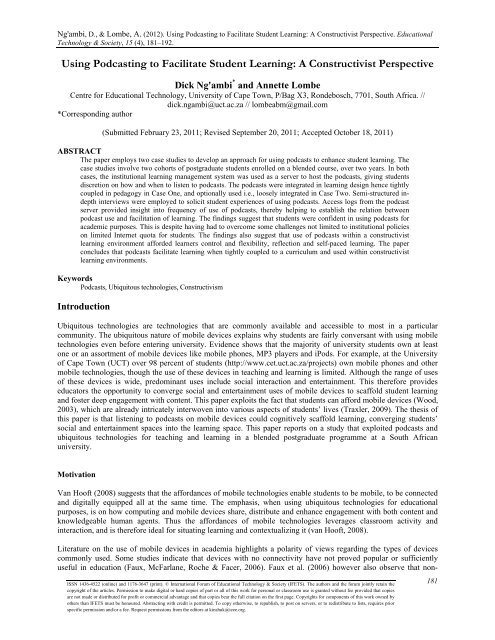October 2012 Volume 15 Number 4 - Educational Technology ...
October 2012 Volume 15 Number 4 - Educational Technology ...
October 2012 Volume 15 Number 4 - Educational Technology ...
Create successful ePaper yourself
Turn your PDF publications into a flip-book with our unique Google optimized e-Paper software.
Ng'ambi, D., & Lombe, A. (<strong>2012</strong>). Using Podcasting to Facilitate Student Learning: A Constructivist Perspective. <strong>Educational</strong><br />
<strong>Technology</strong> & Society, <strong>15</strong> (4), 181–192.<br />
Using Podcasting to Facilitate Student Learning: A Constructivist Perspective<br />
Dick Ng'ambi * and Annette Lombe<br />
Centre for <strong>Educational</strong> <strong>Technology</strong>, University of Cape Town, P/Bag X3, Rondebosch, 7701, South Africa. //<br />
dick.ngambi@uct.ac.za // lombeabm@gmail.com<br />
*Corresponding author<br />
(Submitted February 23, 2011; Revised September 20, 2011; Accepted <strong>October</strong> 18, 2011)<br />
ABSTRACT<br />
The paper employs two case studies to develop an approach for using podcasts to enhance student learning. The<br />
case studies involve two cohorts of postgraduate students enrolled on a blended course, over two years. In both<br />
cases, the institutional learning management system was used as a server to host the podcasts, giving students<br />
discretion on how and when to listen to podcasts. The podcasts were integrated in learning design hence tightly<br />
coupled in pedagogy in Case One, and optionally used i.e., loosely integrated in Case Two. Semi-structured indepth<br />
interviews were employed to solicit student experiences of using podcasts. Access logs from the podcast<br />
server provided insight into frequency of use of podcasts, thereby helping to establish the relation between<br />
podcast use and facilitation of learning. The findings suggest that students were confident in using podcasts for<br />
academic purposes. This is despite having had to overcome some challenges not limited to institutional policies<br />
on limited Internet quota for students. The findings also suggest that use of podcasts within a constructivist<br />
learning environment afforded learners control and flexibility, reflection and self-paced learning. The paper<br />
concludes that podcasts facilitate learning when tightly coupled to a curriculum and used within constructivist<br />
learning environments.<br />
Keywords<br />
Podcasts, Ubiquitous technologies, Constructivism<br />
Introduction<br />
Ubiquitous technologies are technologies that are commonly available and accessible to most in a particular<br />
community. The ubiquitous nature of mobile devices explains why students are fairly conversant with using mobile<br />
technologies even before entering university. Evidence shows that the majority of university students own at least<br />
one or an assortment of mobile devices like mobile phones, MP3 players and iPods. For example, at the University<br />
of Cape Town (UCT) over 98 percent of students (http://www.cet.uct.ac.za/projects) own mobile phones and other<br />
mobile technologies, though the use of these devices in teaching and learning is limited. Although the range of uses<br />
of these devices is wide, predominant uses include social interaction and entertainment. This therefore provides<br />
educators the opportunity to converge social and entertainment uses of mobile devices to scaffold student learning<br />
and foster deep engagement with content. This paper exploits the fact that students can afford mobile devices (Wood,<br />
2003), which are already intricately interwoven into various aspects of students’ lives (Traxler, 2009). The thesis of<br />
this paper is that listening to podcasts on mobile devices could cognitively scaffold learning, converging students’<br />
social and entertainment spaces into the learning space. This paper reports on a study that exploited podcasts and<br />
ubiquitous technologies for teaching and learning in a blended postgraduate programme at a South African<br />
university.<br />
Motivation<br />
Van Hooft (2008) suggests that the affordances of mobile technologies enable students to be mobile, to be connected<br />
and digitally equipped all at the same time. The emphasis, when using ubiquitous technologies for educational<br />
purposes, is on how computing and mobile devices share, distribute and enhance engagement with both content and<br />
knowledgeable human agents. Thus the affordances of mobile technologies leverages classroom activity and<br />
interaction, and is therefore ideal for situating learning and contextualizing it (van Hooft, 2008).<br />
Literature on the use of mobile devices in academia highlights a polarity of views regarding the types of devices<br />
commonly used. Some studies indicate that devices with no connectivity have not proved popular or sufficiently<br />
useful in education (Faux, McFarlane, Roche & Facer, 2006). Faux et al. (2006) however also observe that non-<br />
ISSN 1436-4522 (online) and 1176-3647 (print). © International Forum of <strong>Educational</strong> <strong>Technology</strong> & Society (IFETS). The authors and the forum jointly retain the<br />
copyright of the articles. Permission to make digital or hard copies of part or all of this work for personal or classroom use is granted without fee provided that copies<br />
are not made or distributed for profit or commercial advantage and that copies bear the full citation on the first page. Copyrights for components of this work owned by<br />
others than IFETS must be honoured. Abstracting with credit is permitted. To copy otherwise, to republish, to post on servers, or to redistribute to lists, requires prior<br />
specific permission and/or a fee. Request permissions from the editors at kinshuk@ieee.org.<br />
181

















